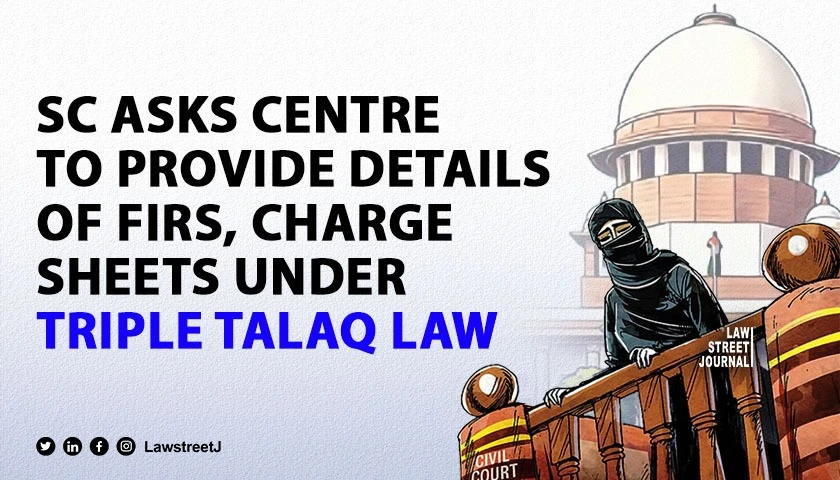NEW DELHI: The Supreme Court on Wednesday asked the Centre to provide information on the number of FIRs and charge sheets filed against Muslim men for pronouncing instant triple talaq.
A bench of Chief Justice of India Sanjiv Khanna and Justice Sanjay Kumar, asked Solicitor General Tushar Mehta to inform as to how many FIRs and charge sheet have been filed against Muslim men, under the law and cases.
Triple Talaq Law: SC Demands Data on FIRs and Charge Sheets
"The respondent (Centre) shall file total number of cases pending under section 3 and 4 of the Muslim Women Protection of Rights of Marriage Act 2019. The other parties also will file their written submissions not exceeding three pages in support of their contention. Also we need the data on the FIRs registered in the rural areas," the court said.
The court was hearing a batch of petitions challenging the constitutional validity of the 2019 Act. A batch of petitions have been filed contending the Act is violative of the fundamental rights enshrined in the Constitution.
Constitutional Validity of Triple Talaq Law Under Supreme Court Scrutiny
The bench fixed the matter for final hearing in the week commencing on March 17, after renaming the case title as 'In Re: Challenge to Muslim Women (Protection of Rights on Marriage) Amendment Act, 2019'.
During the hearing, the bench said, no advocate can defend the validity of triple talaq practice but the question was whether it can be criminalised when the practice is banned and no divorce can take place by uttering talaq three times at one go.
"We will examine it. Let the Centre file its reply," the court said.
A counsel for the petitioner said mere pronouncement has been penalised now with the law.
On this, the CJI said, “I am sure none of the lawyers here are saying that the Triple Talaq practice is correct, but what they are saying is that whether it can be criminalised when the practice is banned and no divorce can take place by uttering Talaq three times at once.”
The bench said, Sikhs, Jains, Buddhists etc are covered under the Hindu Marriage Act.
"We have statutory enactments. We will see," the bench said.
One of the petitioners lawyer, told the top court that in criminal cases, someone is getting beaten up, it takes months to file FIR, here you just say Talaq, you are penalised and even jailed.
Appearing for some of the petitioners challenging the law, one counsel argued that in matrimonial cases, FIRs were not registered for months and here by mere occurrence of words FIRs are filed.
Another advocate said that the mere utterance of words has been criminalised and abandonment is also not a criminal offence for any other community.
Opposing the arguments, the SG Mehta said, its a rare constitutional amendment. He also said that triple talaq is not prevalent in other communities.
The petitioners sought an immediate interim stay on the law, which came into force on August 1, 2019 after receiving the presidential assent.
The petitioners -- including Samastha Kerala Jamiathul Ulema, a Kerala-based organisation of the Sunni Muslim scholars and clerics, Amir Rashadi Madni -- and others, in their petition claimed that the law could create "grave public mischief and may lead to polarisation and disharmony in society".
The petitioner further argued that the sole aim and objective of the new law was “to punish the Muslim husbands”.
In an affidavit, the Union government has in August, 2024 said the Constitution bench in 2017 Shayara Bano case by majority of 3:2 itself has held the practice of triple talaq as unconstitutional, it cannot be argued that a law criminalising the practice is manifestly arbitrary.















